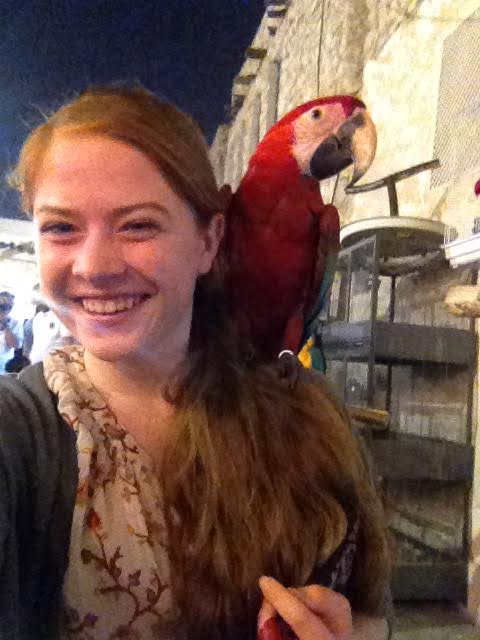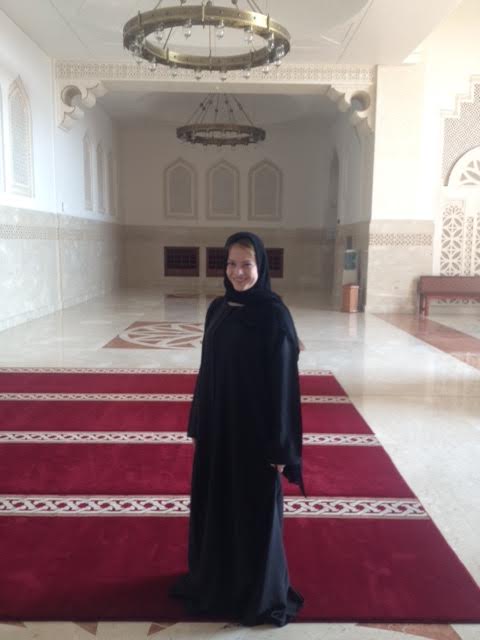By Jeff Brumley
When Macon native and Mercer University student Alayna Williams signed up for a cultural exchange trip to Qatar a few months ago, she and the rest of the family decided not to tell dad.
“They didn’t tell me right away,” said Keith Williams. In fact it was “just a few days beforehand” that he learned what the rest of the Williamses had known for a while: that Alayna, 20, would be part of a group of 10 American college students to visit the Persian Gulf nation Nov. 27 to Dec. 4.
After all, the nervous dad had only just endured his daughter’s Mercer on Mission trip this past summer to India.
“It definitely concerns me until the day she’s back safely,” Keith Williams said. Otherwise “you are worried the whole time.”
This latest journey was more intense, he said.
“Being her father, it was a scary thing.”
Debunking stereotypes
But as Alayna Williams said before the Qatar trip, and as she is saying now, there was nothing to be afraid of traveling to Qatar, a peninsular nation that borders Saudi Arabia at its base and is surrounded on three sides by the waters of the Persian Gulf.
In fact, if there is anything to worry about, she said it’s the United States’ reputation as increasingly hostile towards Arabs and Muslims.
Alayna Williams said her delegation, which was coordinated by the National Council on U.S.-Arab Relations, visited government, cultural and business leaders in Qatar. They explained the nation’s economic and social progress.
But they also voiced concerns about the steady stream of news emanating from the United States, including rhetoric about banning Muslims.

The Qatari minister of foreign affairs addressed the group, Williams said, explaining that American Islamophobia is problematic for the nation at a time when it is trying to become more of an international player.
Qatar is considered an advanced, modern nation in the region. It emphasizes equal rights among men and women, focuses on practicing sustainable development and clean energy sources, Williams said.
“With the controversy right now over Islam and Muslims in our society, they wanted us to see that Qatar is very progressive and that the negative stereotypes are simply untrue,” she said.
‘Thinking about the world’
More than that, Qatar could provide a model for the U.S. to follow for living beside refugees and immigrants, she said. Qatari nationals represent just under 20 percent of the population, the rest being expatriates and migrant workers.
“It’s a very international community, with people from Europe, Southeast Asia and other parts of the Middle East,” she said.
“It’s working for them,” Williams added. “They seem to be getting along just fine.”
Seeing that lived out in Qatar reinforced Williams’ support for refugees, including Syrian refugees, coming to the United States.
“It does provide hope for us that people from the world can cooperate,” she said.
But her return from overseas came just in time to see anti-Muslim attitudes escalating to worrisome levels.
“To see people apply such stereotypes to a vast group of people is concerning,” Williams said. “It’s only going to create greater instability and increased conflict — I think we have taken many steps back in the past couple of months.”
Williams’ intensifying interest in these issues began in the international baccalaureate program at Central High School in Macon. Its global curriculum intrigued her from the beginning.
“There was an interest and a focus on thinking about the world and looking outside your own experiences and thinking about what other people are experiencing,” she said.
‘Lump the Middle East together’
Williams, a member of North Macon Church of Christ, said she’s also always had a big interest in politics and news.
At Mercer, she’s been involved in Model Arab League, in which students hold conferences and discuss and debate issues of concern in Northern Africa and the Middle East.
Their work includes drafting and passing resolutions, some of which deal with migrants and refugees. So much is happening in the region that it can be overwhelming, she said.

“It’s really relevant today,” Williams said. “It’s a region with a lot of history and conflict, and also a region with a lot of potential.”
And the program is what led her and nine other students, from Texas, California, Michigan, South Carolina and other states, to Qatar.
Williams said she never worried for her safety, and that it was a no-brainer opportunity for her.
“We tend to lump the Middle East together and assume it’s all the same and there’s no diversity,” she said. “If anything, I learned there are huge differences between the countries in the Middle East.”
‘A very strong person’
During the visit, the group toured Qatar’s liquefied natural gas complex and visited government offices, mosques, market places and museums.
The experience has only whet Williams’ appetite for international experiences. She’s already considering the Peace Corps, foreign service work or work with a non-governmental organization.
“I want to go to grad school but not right away — first, more global experience.”
And that experience will have a purpose, she added.
“My motivation is that everyone should have the right to practice what they believe.”
And Keith Williams said he is preparing himself for his daughter’s upcoming adventures by reminding himself, as he did during her Qatar trip, that this is who Alayna is.
“I had fear and worry and all that, then I thought about this is something she wanted to do,” he said. “She is a very strong person.”
